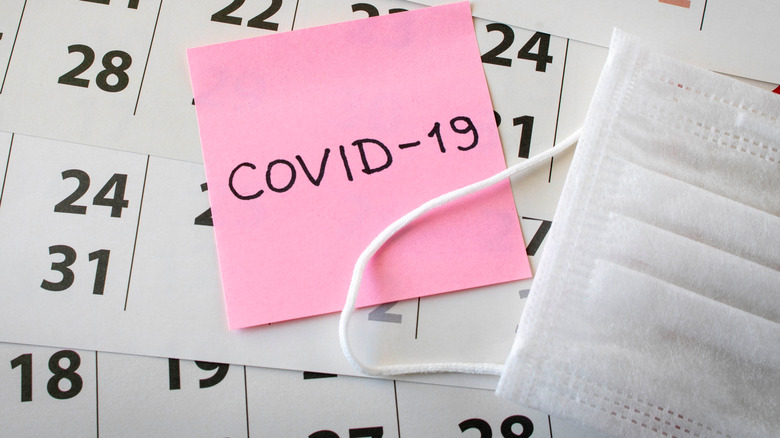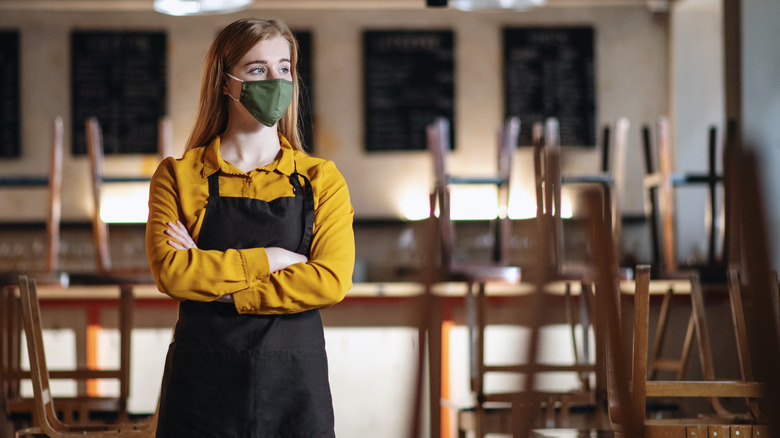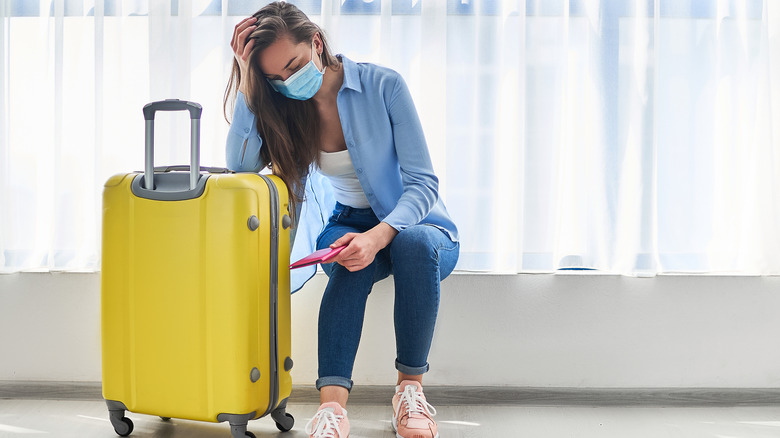What Does The Current Rise In COVID-19 Cases Mean For 2022?
As the world welcomed the arrival of 2022, many New Year's Eve celebrations across various countries looked similar to those of 2021, with various precautions once again put in place in light of the recent rise in COVID-19 cases across the globe. In New York City, only 15,000 masked and vaccinated individuals were permitted to gather in Times Square to witness the famous ball drop, while in Paris, firework celebrations were canceled altogether (via U.S. News & World Report). Immediately upon arrival, 2022 has already been impacted by COVID-19.
The current surge of cases has largely been attributed to the highly transmissible Omicron variant. Professor of emergency medicine at Brown University's School of Public Health Dr. Megan Ranney told CNN that the variant is virtually "everywhere." In just days prior to the start of the new year, the U.S. surpassed its previous record averages of new daily cases per week. Such increases have put additional strain on healthcare workers, overwhelming both staff and availability of services.
A January surge
Describing the Omicron variant as "extraordinarily contagious," CNN medical analyst Dr. Jonathan Reiner emphasized to the public that previous preventive measures may no longer hold up in the same ways they have against previous strains. "At the beginning of this pandemic ... we all were taught, you have a significant exposure if you're within six feet of somebody and you're in contact with them for more than 15 minutes. All these rules are out the window," Reiner revealed. Unlike previous variants, health experts stress that infection of the Omicron variant can occur within a matter of seconds, such as while briefly removing one's mask to take a sip of water.
Due to its high transmissibility, health officials believe the first month of the new year will be off to a rough start. Dean of the Brown University School of Public Health Dr. Ashish Jha echoes this prediction, telling CNN, "January is going to be a really, really hard month. And people should just brace themselves for a month where lots of people are going to get infected."
Business closures and staffing shortages continue
While many hope that the return of small businesses will be plentiful in 2022, health officials continue to voice economic concerns related to rising COVID-19 infection rates. With the holidays already having been a major source of widespread shutdowns across the country, reported positive cases among employees and subsequent staffing shortages have hit the restaurant industry particularly hard. KMOV4 reports that neighborhood cocktail bar in St. Louis, Small Change, is operating with only 25% of their staff, with 75% having tested positive for COVID-19 infection. Other restaurants in similar circumstances have been forced to close altogether, including over particularly profitable holidays such as Christmas and New Year's.
Restaurants are not the only businesses feeling the impact of the Omicron variant. Major companies including Chevron, Uber, Google, and Apple have made the decision to postpone employees' originally scheduled dates to return to work due to the rise in cases (via CNBC).
Professor of emergency medicine at Brown University's School of Public Health Dr. Megan Ranney expressed concerns to CNN over continued business closures in 2022, saying, "What I am so worried about over the next month or so is that our economy is going to shut down, not because of policies from the federal government or from the state governments, but rather because so many of us are ill."
Transportation delays and cancellations to be expected
Transportation services may continue to be impacted into 2022, as the Omicron variant continues to have an effect on staffing, particularly for airlines. Reuters reports that as of Sunday, January 2, more than 4,000 flights were canceled and over 11,000 flights were delayed worldwide. With both flight attendants and pilots absent from work due to COVID-19, services were halted as employees voiced concerns over working overtime during the holiday Omicron surge.
Cities with public transportation services are also navigating similar circumstances. Subway train services in New York City have been interrupted with the recent halting of subway lines B, Z, and W as they await the return of operators currently out due to COVID-19 infection (via CNN). Continuing to keep passengers updated hourly via their Twitter account, tweets from NYCT Subway repeatedly conclude with the statement, "We're running as much service as we can with the train crews we have available."
The academic school year will look different for students in different states
Resuming the academic year in 2022 may look different across states. As some school districts return to in-person classes from their end-of-the-year breaks, others are implementing new preventive measures. And still others plan to continue virtual remote learning at least for the immediate future (via The New York Times). Among them are public schools in certain areas of New York, New Jersey, and Washington D.C. which will be implementing virtual learning for at least one week during the first month of 2022. Other school districts in areas such as Chicago and Miramar, Florida, are pushing forward with in-person learning.
Some educators and parents have voiced concerns in regards to returning to school and the potential for COVID-19 exposure. Miramar, Florida resident and parent Kelli Gay told The New York Times, "High anxiety would be how I would describe what I am feeling. So now our hopes are riding on enforcing the home rules, on the kids staying masked at school, keeping their distance and a little bottle of hand sanitizer in their backpacks."
Emotional responses to 2022 are shifting
Although challenges lie ahead as COVID-19 cases are on the rise, a recent telephone survey of over 1,000 participants across the country conducted by CBS indicates that many individuals are looking on the bright side as they enter 2022. Some 40% of Americans reported that they associated 2021 mostly with "sadness." However, when it comes to 2022, 71% of individuals responded saying they feel "hopeful." Still, 22% of participants reported feeling "discouraged."
Mental health counselor Paige Hartmann responded to The Sun Chronicle regarding how these findings appear to be reflected amongst patients, saying, "In my experience, I would agree with this statistic. Several of the clients I treat are beginning to feel increased hope for the future, whereas there are some clients who continue to struggle to find hope and a sense of peace. These clients may worry about the spread of COVID, work related issues, providing and caring for their families, and finding their place in our 'new normal.'"






